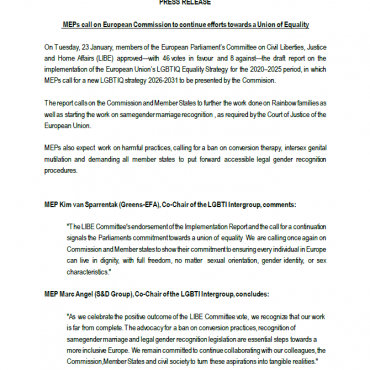Macedonian Parliament debates proposed anti-discrimination law with Euro MP
 Today the Parliament of the Former Yugoslav Republic of Macedonia held a public debate on a proposed anti-discrimination law that falls short of EU standards, notably for its omission of sexual orientation and gender identity as grounds of discrimination. The Permanent Committee for Protection of Freedom and Rights welcomed Ulrike Lunacek MEP, who debated the proposed legislation with members of the national ruling party.
Today the Parliament of the Former Yugoslav Republic of Macedonia held a public debate on a proposed anti-discrimination law that falls short of EU standards, notably for its omission of sexual orientation and gender identity as grounds of discrimination. The Permanent Committee for Protection of Freedom and Rights welcomed Ulrike Lunacek MEP, who debated the proposed legislation with members of the national ruling party.
The public debate attracted strong interest from national media and civil society representatives, and focused on the proposed anti-discrimination law in the context of the country’s accession to the European Union.
Ulrike Lunacek MEP, Co-president of the European Parliament’s Intergroup on LGBT Rights and substitute member of the South-Eastern Europe Parliamentary Delegation, stated that EU accession was conditional upon recognising sexual orientation as a ground of discrimination. After the debate, she commented: “Combating discrimination is part of the EU Treaties, and there is no opting out from fundamental rights. I was rather disappointed at the obvious lack of accuracy in the course of negotiations for visa liberalisation for Macedonian citizens—which a majority in the European Parliament supported.”
The recent agreement on visa liberalisation for Macedonian citizens implied a progress towards EU-level anti-discrimination provisions, which were subsequently scrapped from the draft law. Ulrike Lunacek MEP continued:
“MPs from the ruling party are afraid of same-sex marriage and adoption. But I responded: ‘Fear is the worst possible guide in politics!’ Furthermore, both Albania and Serbia adopted broad anti-discrimination laws; why would the Former Yugoslav Republic of Macedonia isolate itself?”
“This is not about ideology; this is about prevention, and this is about protection—genuine equality needs everyone’s dedication!”
The draft law is due to be formally discussed by the Parliament of the Former Yugoslav Republic of Macedonia in March. The European Parliament and the European Commission will keep monitoring the protection of minorities in candidate countries as a condition for EU accession.







